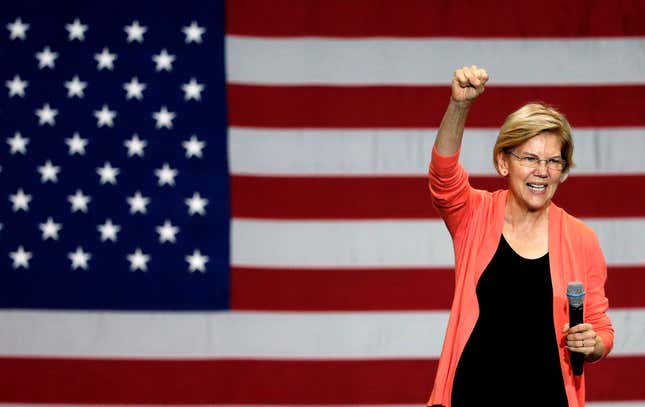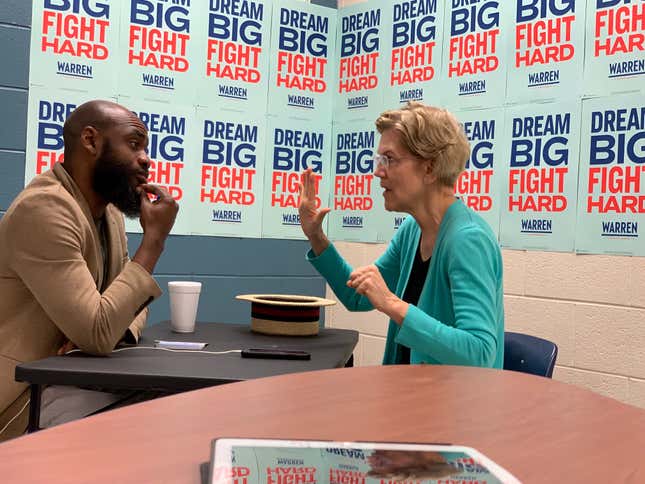
Summerton, S.C.—Sen. Elizabeth Warren is something of a MacGyver on the campaign trail. She has that rare ability to seamlessly break down the most complex policy challenges and not leave you feeling like an idiot. It has been this intellectual range—not to mention those hourslong selfie lines—that has elevated her to the top of the pack in the 2020 primary race. So I decided to use my 15 minutes with Warren to ask her a policy question that has stumped every well-meaning politician in recent memory: Can capitalism exist without racism?
She didn’t hesitate.
“I think it’s all about the rules you put in place,” she told me, punctuating her points with moving hand gestures as if guiding me to a place of understanding. “And I think that’s true, regardless of the system you’re talking about. Racism can exist in any system. The question is what kind of rules are you going to put in place and how you’re going to enforce them?
“So for me, markets without rules, it’s just theft,” she continued. “It’s just a way to cheat people. It’s just a way to steal their labor or steal their money or steal their houses. And we’ve watched that happen. But it’s also the case that we can put rules in place that fight back against that and say, ‘You know what? We create opportunity for a lot of folks.’”
It’s a Saturday morning and we’re sitting in Scott’s Branch High School in Summerton, a small town an hour and fifteen-minute drive from Columbia, the capital of South Carolina. Warren is soon to lead a roundtable discussion addressing racism in education. She’s been traveling to this state for months in hopes of closing the gap of black support between herself and former Vice President Joe Biden. Her campaign and surrogates tell me that the senator is in close range of competing for enough black support that will help her secure the Democratic nomination in time for the Democratic Convention in Milwaukee next summer.
As with all primaries, it all comes down to the economy. What makes Warren’s candidacy unique is that she sells herself as having a solution for every problem facing Americans. Racism and economic inequality are the top issues in the minds of most black voters, so her belief that capitalism can actually work without racism is one that should draw attention.
She brings up President Barack Obama in her answer about rooting out racism in capitalism, citing her idea to create the present-day Consumer Financial Protection Bureau (CFPB) while working as a special advisor to Obama in 2010 until 2011.
“I had this idea for this agency. I go to Washington and people tell me two things: [The first is] ‘This is a great idea. You can actually make a difference.’ And the second thing they say to me is ‘Don’t even try, because the big money is going to fight you on it, the big banks are going to fight you on it, the lobbyists are going to fight. The Republicans are going to fight you on it. Shoot, a bunch of Democrats are going to fight you on it.’ But Barack Obama liked the idea and he said, ‘Stay in the fight.’ So we took that fight on. We took on the big money and, in 2010, Barack Obama signed that agency into law and now here comes the best part: That little agency has forced big banks to return nearly $13 billion that families were cheated out of.”

The mortgage crisis of 2008 disproportionately hit black Americans the hardest and studies reveal that its impact will be felt for decades. As Warren sees it, the racist, predatory lending that took place could have been stopped by a heavily regulated market that kept banks in check. It is all about equitable governance; investing in school systems equally, regardless of race; supporting HBCUs so that they are on the same level playing field as predominantly white institutions and making government and private actors pay a steep price if they discriminate in any area of business or government—like preying on black people with crappy mortgages.
However, some of the brightest thinkers have long argued against the trappings of capitalism and believe the economic system needs to be tossed altogether.
The Black Liberation Collective says capitalism justifies the oppression of black people through marginalization and exploitation. Sudip Bhattacharya outlines in New Politics how the Founding Fathers created something of a hierarchy between poor and wealthy whites that inevitably strengthened their white supremacist project by empowering poor whites to abuse the liberty of black people, no matter their economic status. “Whiteness provides for some to be included into the mainstream but on terms that preserves the overarching economic and political structure of capitalism, which means that the wealth produced by white and black workers is still to be siphoned off into the coffers of the capitalist class,” she wrote. Aaron Ross Coleman wrote in the Nation in May how reaching the pinnacles of black capitalism does nothing to achieve the wider objective of black liberation.
Bernie Sanders’ rise in 2016 as a very serious threat to Hillary Clinton revealed an appetite for change in the current system. Sanders’ Democratic socialist outlook on economics won over much of the Midwest and continues to resonate with enough voters to pose a serious threat to Warren, who has made it clear she does not share Sanders’ critique of capitalism.
An hour after our interview, Warren called me to add a few points about racial equality in capitalism. I explained to her some of the criticisms: That the system was designed so that there would be a top and a bottom and that the system was built on the premise of racism.
“I want us to look at it the other way. Racism can be part of government,” she said. “We have a lot of experience with that. It’s not like saying, ‘We’re going to move to a different form of government that means racism will be over.’ It doesn’t. The government can carry out racist policies, no matter whether they support markets or some other form of allocating goods in the economy. Racism can shoot through any form of government and it is critically important to be willing to tackle racism head-on. The country still lives with the racist effects of generations of wrong committed both by private actors and by government actors. That was the point I was making about CFPB and regulations. It’s part of the point about housing and HBCUs. The government said we’re gonna invest in public education and put a lot of money into state universities and then turn around and say but black students won’t be welcome there. So that’s not capitalism. That’s government-sanctioned racism.”
Another major issue facing black America is that of unemployment. The black unemployment rate has averaged twice that of whites since at least the 1950s when data on it was first collected and that gap has not closed much since then.
I asked Warren if she would be able to close that gap as president and she didn’t hesitate.
“Yes.”
No one has been able to close it, I told her. She said it comes down to using the power of the presidency. For example, she says that one in every four people in America works for a company that gets federal contracts. The terms of who gets to bid for them is set by the administration, she told me. So, for Warren, her requirement is that if you want a bid for all those “zillions of dollars of federal contracts,” then she wants to see who you’re hiring and what you’re paying them. Is there a difference based on race? Are contractors hiring both black and white or are you just hiring white? Are they hiring men and women, or are they just hiring men?
Sen. Kamala Harris, Warren’s primary opponent, has called for investment in HBCUs, black homeownership, and punishing businesses that practice discriminatory hiring and promotion practices. Most of the 2020 field firmly believes in capitalism and have presented ways in which the system can be more fair to black Americans. But if Warren is to take her candidacy a step further, she’ll ultimately have to demonstrate that her passion for a racially equitable America can match her intellectual dexterity for breaking down policy.
Before we ended our conversation, I asked Warren about the decriminalization of sex work and how her views on the subject have evolved.
“I’ve had wonderful conversations with these women who have really opened my mind to see things I hadn’t seen before about the impact of criminalization of sex work,” Warren said. “So I’m open to this. The one part I want to make sure that we’re careful [with] when we design the rules again is that we can’t exploit the vulnerable. We’ve got to be really careful that children are protected, that people aren’t trafficked, that you don’t end up with folks who take advantage by getting people hooked on drugs and then you get them into sex work involuntarily. As long as we’re careful in the laws about making sure that we’re not exploiting people, then I fundamentally believe you ought to be able to do for yourself what you want to do for yourself.”
Indeed, Warren has garnered the support of a diverse group of black women whose values intersect with the Black Lives Matter Movement and the LGBTQ+ justice and labor communities. She will give a major speech in Atlanta Nov. 21 on the legacy of black women and the labor movement. It will be a critical testing ground for her candidacy. A year ago, Stacey Abrams proved that a black woman was ready to govern a southern state—before her GOP opponent stole the opportunity from her. To this day, Abrams feels the Democrats can win Georgia.
Warren can start next week by demonstrating that her belief in regulated markets will help black women’s labor finally match the white man’s dollar.

